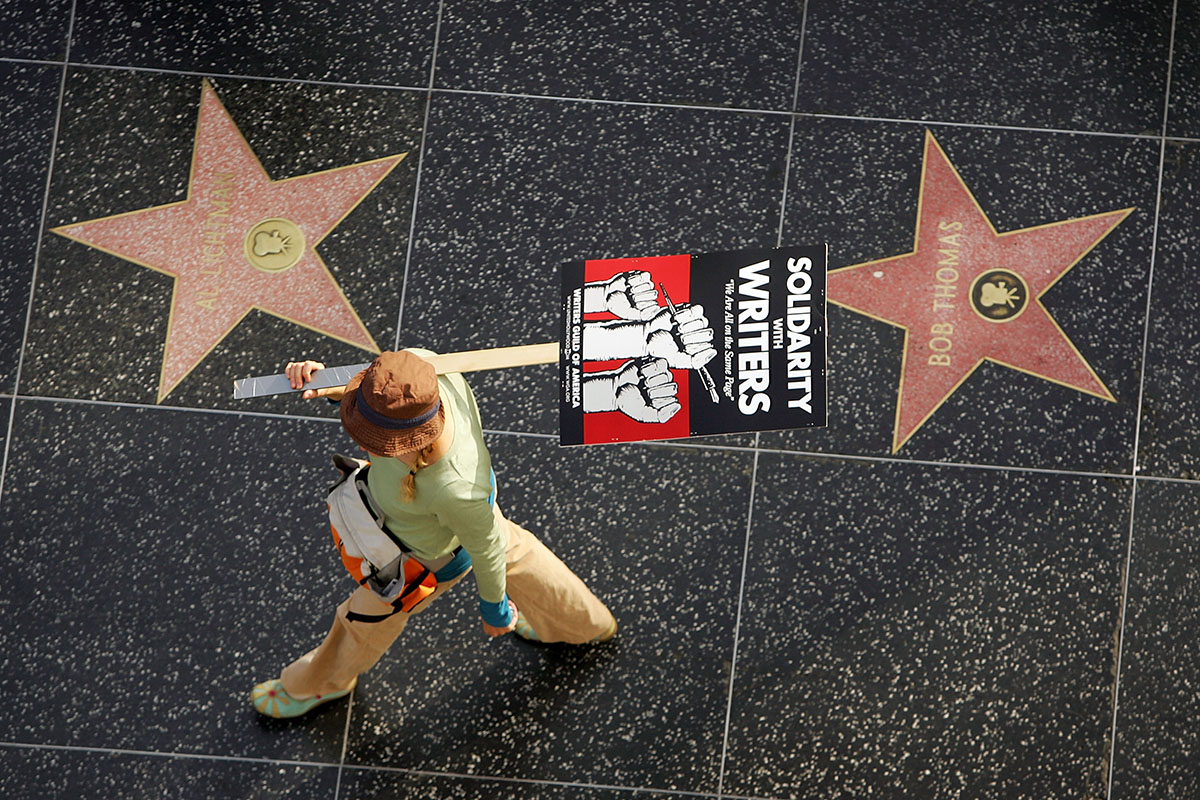The AMPTP’s AI Reality Is Fundamentally Different From Workers’

SAG-AFTRA (Screen Actors Guild-American Federation of Television and Radio Artists) has officially announced they are going on strike, due to contract negotiation breakdowns with the Alliance of Motion Picture and Television Producers (AMPTP). Many SAG-AFTRA members were already joining the Writers Guild of America (WGA) on the picket lines since the WGA started their strike in May, but the situation now is even more unified.
On the very same morning of the announcement, Bob Iger, the CEO of Disney, lamented that he found the guild’s demands and willingness to strike “very disturbing.” But the more that’s revealed about the situation from the AMPTP’s side, the more you wonder whose actions are disturbing. Just this week, a Deadline report found a source willing to admit the AMPTP is waiting to bring the WGA back to the negotiation table until picketing writers begin losing their homes due to lack of income.
Another disturbing sticking point of the AMPTP’s attitude is around AI. Protections against the unregulated use of AI, which could result in a mass loss of jobs (among other issues), is a central point in both the WGA’s and SAG-AFTRA’s demands. In the WGA’s case, the AMPTP essentially refused to negotiate. The WGA asked for specific protections. In response, the AMPTP offered annual meetings to discuss AI advancements. That’s it.
It seems the disconnect between the AMPTP and everyone else has perhaps deepened even further in the ensuing months. In a memo (via the Hollywood Reporter) to save face in the wake of SAG-AFTRA’s strike announcement, the AMPTP released what they say they offered SAG-AFTRA. This included a “groundbreaking AI proposal which protects performers’ digital likenesses, including a requirement for performer’s consent for the creation and use of digital replicas or for digital alterations of a performance.”
The questions to ask here is “consent when, for what, and for how long?” Because SAG-AFTRA’s chief negotiator Duncan Crabtree-Ireland revealed in a press conference that the proposal is more disturbing and exploitative than it is “groundbreaking.” It’s also very in line with what I kept hearing from SAG-AFTRA members in a WGA picket line in New York a month ago.
The “consent” the AMPTP is so proud of in its statement is probably just for that initial day. You “consent” to a contract where your image is only worth one day of pay, and then it’s the studio’s forever and ever. These kinds of damning clauses can also be buried inconspicuously within a contract, purposefully difficult to find.
Earlier this year, the New York Times reported a voice actor got a contract from Netflix which would have granted the studio the right to use a simulation of the actor’s voice “by all technologies and processes now known or hereafter developed, throughout the universe and in perpetuity.” That “throughout the universe and in perpetuity” bit always knocks me off my feet for how incredibly Dr. Evil-adjacent it is in its hyperbole. The AMPTP could argue (and have a legal basis) that signing the contract meant the actor gave consent.
Also, can I just say: how dystopian have we become that getting someone’s consent to use their image in unknown and potentially currently inconceivable ways is “groundbreaking”? (Also yes, don’t worry: plenty of people on Twitter have wasted no time in pointing out that this is very literally the plot of an episode of Black Mirror.)
In another statement, the AMPTP lamented the rejection of their “groundbreaking AI proposal that protects actors’ digital likenesses for SAG-AFTRA members.” After all of this, I truly wonder what the AMPTP thinks they are “protecting” these actors and their performances from. From being able to get more than one job as an extra in your entire life? From another studio being able to steal your image, which has already been granted to one studio “throughout the universe and in perpetuity”? From being able to make anything that approaches the all-too-low bar we creatives have learned to call “a living”?
The way the AMPTP sees the A.I. issue is fundamentally different from how the WGA and SAG-AFTRA are beseeching us all to see it from a workers’ perspective. The AMPTP sees A.I. as a way to cut labor costs and refuses to think one second beyond those extra dollar signs—despite the fact that, say, Bob Iger makes $27 million a year while writers can barely afford rent and sometimes have to live on welfare.
In the words of SAG-AFTRA president Fran Drescher: “I cannot believe it, quite frankly, how far apart we are on so many things. How they plead poverty that losing money left and right while giving millions to CEOs. It’s disgusting, shame on them.”
(Featured image: David McNew/Getty Images)
Have a tip we should know? [email protected]
